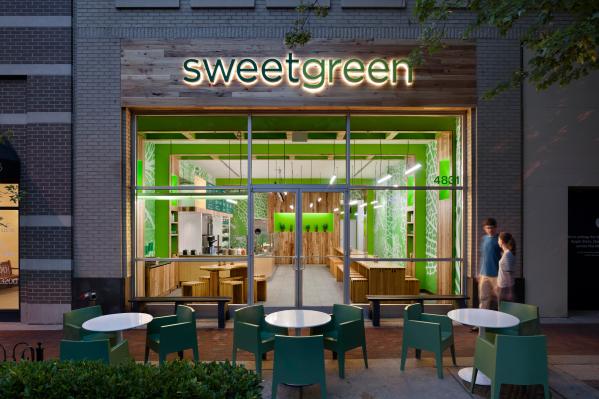Local, organic salad chain Sweetgreen has attracted $22 million in funding from Revolution Growth, the investment fund founded by Steve Case, Ted Leonsis, and Donn Davis. Along with the funding, Case will join the board and advise Sweetgreen founders Nicolas Jammet, Jonathan Neman, and Nathaniel Ru.
Sweetgreen is a farm-to-table salad chain that was founded in Washington, D.C. by three Georgetown students in 2007. The trio were hoping to solve a problem that they had, which was how to find healthy and organic fast food near the university’s campus. With a dearth of great options around, they decided to create their own healthy food hangout.
That extends both to its food, most of which comes from local farms and suppliers, as well as to its store design. Sweetgreen partners with local suppliers to bring fresh, local, and seasonal produce, which means a regularly changing menu of options for customers.
Meanwhile, its shops have been designed to have an open, clean feel, while also having a minimal environmental impact. They incorporate reclaimed materials and use eco-conscious packaging. About half of customers take their custom-made salads to go, while the other half eat in, according to Sweetgreen co-founder Nathaniel Ru.
Over the years, Sweetgreen has expanded its presence on the East Coast, with 22 locations scattered around Washington, D.C., Maryland and Virginia, as well as shops in Philadelphia, Boston, and New York City. It has another three shops opening soon, in NYC’s Tribeca, Center City Philadelphia, and the Yards in Washington, D.C.
But the bigger plan is to make it a lifestyle brand synonymous with healthy eating, kind of like the Starbucks or Chipotle of salads. And that’s where Revolution and Steve Case’s involvement comes in.
Ok, so it’s not really a tech company, but it’s a tech-enabled company: According to Ru, the company uses a platform called FarmersWeb to manage its supply of local produce sent to its different regional locations.
It also has a mobile app (powered by LevelUp) that enables customers to pre-order and pre-pay for salads that they can pick up at local shops. That lets customers skip the lines and speeds up order processing for its employees. Launched just 10 months ago, orders made through the app already make up about 20 percent of Sweetgreen’s total revenue, Ru told me.
Not being a tech company per se doesn’t bother Case, who believes Sweetgreen’s focus on providing healthy options in the fast food or fast casual category of restaurants follows other investments Revolution has made around health and wellness. That includes health information company Everyday Health, fitness tracking app Runkeeper, and even specialist e-commerce company Gaiam. Together, all of those investments follow a larger trend of offering consumers ways to improve their personal wellness, by giving them more information and healthier choices.
At the end of the day, however, a lot of it comes down to what they eat.
From that perspective, Case is optimistic that people will make healthier choices if they’re “convenient and fun and tasty,” and Sweetgreen is all those things. Thanks to a generational shift to people who eat out more but are more conscious of what they eat, as well as better information available about their meals due to regulations about calorie listings and the like, Case believes that consumers are overall making better decisions now.
For a fast-growing company like Sweetgreen, that change in consumer behavior plays directly to its strengths. With that in mind, it’s going to use Revolution’s funding, and Case’s expertise, to help grow its brand in new markets.
And hey, strategically expanding a business and building a big national brand are things that Case and Revolution know a thing about. Besides founding AOL, they had also helped to build and scale businesses like ZipCar and LivingSocial, after all.
